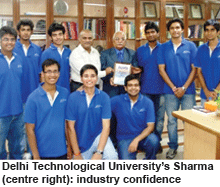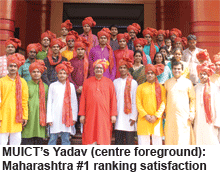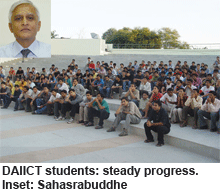India’s Best Non IIT Engineering Colleges 2013: State Rankings
For the managements of the great majority of institutes listed in the inaugural EW-C fore league tables of the country’s most admired non-IIT engineering colleges/technology institutes, their ranking within state boundaries may well be more valuable than national rank. India’s 28 states and seven Union territories are linguistically, culturally and even ethnically so diverse that usually students and especially faculty, prefer to study and work within state boundaries.
 It’s also pertinent to note that by global norms, most of India’s 28 states — whose boundaries were redrawn on the basis of dominant vernacular languages in 1956 — are almost countries characterised by vast geographies and huge population. For instance, Uttar Pradesh comprises 243,286 sq. km and hosts a population of 200 million equal to the populations of the UK, France and Germany combined. Maharashtra extends over 307,713 sq. km and has a population of 112 million.
It’s also pertinent to note that by global norms, most of India’s 28 states — whose boundaries were redrawn on the basis of dominant vernacular languages in 1956 — are almost countries characterised by vast geographies and huge population. For instance, Uttar Pradesh comprises 243,286 sq. km and hosts a population of 200 million equal to the populations of the UK, France and Germany combined. Maharashtra extends over 307,713 sq. km and has a population of 112 million.
In the circumstances, even though students are more willing to cross state boundaries for higher education, professors, lecturers and academics with family responsibilities tend to be less migratory. Consequently, even if they don’t say so overtly directors and top brass of all education institutions tend to derive greater satisfaction from their state rankings.
“Supplementing national rankings of engineering and professional education institutions with state-level rankings is useful value addition. For institutional managements the competition for students, faculty and reputation from colleges next door rather than another state, is usually a more pressing consideration. That’s why all the major global university rankings such as QS and THE also provide disaggregated global, Asia and sectoral league tables. Moreover state-level rankings are helpful for students and faculty who may not — for whatever reason — be able to relocate to other more distant states,” concurs Dr. R. Natarajan, former director of IIT-Madras and chairman of the Delhi-based All India Council of Technical Education, the apex-level organisation which licences all institutions of engineering and technology education nationwide.
Therefore it’s unsurprising that the top managements of India’s most admired engineering colleges/technology institutes other than the IITs, who believe that they deserve higher ranking in the national league tables, derive considerable comfort from their high state and parameter rankings.
“While I am pleased about the inclusion of Delhi Technological University (DTU) in your all-India engineering colleges table, we are truly delighted by our #1 ranking in Delhi and our #2 national ranking on the parameter of placements. These latter rankings more accurately reflect the confidence that industry and society in the Delhi National Capital Region — which hosts some of India’s largest and fastest growing companies — repose in this institute. Likewise the # 2 national ranking on the parameter of placements in industry reflects the faith that the country’s most reputed companies including multinationals, have in DTU, which has a vibrant culture of research and innovation that percolates right down to undergraduate levels,” says Dr. P. B. Sharma, an alumnus of Birmingham University, former professor at IIT-Delhi and founder-director of the Rajiv Gandhi Technological University, Bhopal, and currently director of DTU.
 Promoted in 1941 as the Delhi College of Engineering, the college was rechristened DTU and conferred university status in 2009. Currently, the university offers 15 undergraduate and 22 postgrad study programmes to 2,585 students mentored by 80 faculty in the national capital. “The distinguishing characteristic of DTU is that it provides a seamless environment for education and research with a focus on the integration of science with engineering,” adds Sharma.
Promoted in 1941 as the Delhi College of Engineering, the college was rechristened DTU and conferred university status in 2009. Currently, the university offers 15 undergraduate and 22 postgrad study programmes to 2,585 students mentored by 80 faculty in the national capital. “The distinguishing characteristic of DTU is that it provides a seamless environment for education and research with a focus on the integration of science with engineering,” adds Sharma.
Similarly Dr. G.D. Yadav, R.T. Mody Distinguished Professor and J.C. Bose National Fellow, and incumbent vice-chancellor of the Mumbai University Institute of Chemical Technology (MUICT, estb. 1933) — India’s sole state government-owned deemed university which has an aggregate enrolment of 2,196 undergraduate and postgrad students including 645 Ph D scholars on its muster rolls — describes the institute’s top 15 national ranking and particularly its #1 ranking in Maharashtra as “wonderful news”. “I am particularly proud that we have been ranked the #1 engineering college in the most industrialised and progressive state of the country. The results of your survey confirms that MUICT is India’ # 1 institute of chemical engineering and #4 worldwide according to a survey published by the Georgia Institute of Technology last year. We are and intend to remain an innovation university which is inclusive, expansive, quality conscious and committed to solving society’s problems,” says Yadav.
 The recognition and appreciation that the inaugural EW-C fore survey has heaped upon non-IIT engineering colleges whose managements are striving to rise to IIT and beyond standards in off-the-beaten-track locations is also welcomed by Dr S.C. Sahasrabuddhe, a communications and signals alumnus of Leningrad University, former deputy director of IIT-Bombay and chief technology officer of Global Telesystems and currently director of the “fourth wave” Dhirubhai Ambani Institute of Information and Communications Technology, Gandhinagar, Gujarat (DAIICT, estb. 2001). “When DAIICT was promoted a decade ago, we broke new ground in engineering education as the only institution to offer degrees in ICT countrywide. And as an institution promoted by Reliance Industries — India’s largest private sector company — it has been visualised as a single programme institution of global standing. Since then we have been moving steadily forward in the rankings of several national publications including EducationWorld. We have already crossed the milestone of being ranked the #1 engineering college in Gujarat and entering the Top 10. Moreover, I am pleased to note that on the parameters of faculty competence and faculty welfare and development — focus areas of DAIICT — we are ranked #5 and #3 countrywide. I am confident our steady progress towards being ranked among the world’s best ICT education institutes will continue,” says Sahasrabuddhe.
The recognition and appreciation that the inaugural EW-C fore survey has heaped upon non-IIT engineering colleges whose managements are striving to rise to IIT and beyond standards in off-the-beaten-track locations is also welcomed by Dr S.C. Sahasrabuddhe, a communications and signals alumnus of Leningrad University, former deputy director of IIT-Bombay and chief technology officer of Global Telesystems and currently director of the “fourth wave” Dhirubhai Ambani Institute of Information and Communications Technology, Gandhinagar, Gujarat (DAIICT, estb. 2001). “When DAIICT was promoted a decade ago, we broke new ground in engineering education as the only institution to offer degrees in ICT countrywide. And as an institution promoted by Reliance Industries — India’s largest private sector company — it has been visualised as a single programme institution of global standing. Since then we have been moving steadily forward in the rankings of several national publications including EducationWorld. We have already crossed the milestone of being ranked the #1 engineering college in Gujarat and entering the Top 10. Moreover, I am pleased to note that on the parameters of faculty competence and faculty welfare and development — focus areas of DAIICT — we are ranked #5 and #3 countrywide. I am confident our steady progress towards being ranked among the world’s best ICT education institutes will continue,” says Sahasrabuddhe.
The encouraging outcome of the inaugural EW-C fore non-IIT Engineering Colleges Rankings 2013 is that the sentiments of institutional pride — the precondition of institutional development — are discernible in India’s next-best institutions of engineering education which are making strong efforts to close the quality gap which separate them from the country’s high-profile IITs.
That hitherto ignored engineering colleges — many of them sited among untrodden ways — have become quality conscious and are utilising new technologies to raise teaching-learning and research standards to IIT and often global standards, is a promising development for Indian industry and the country’s languishing manufacturing sector.
To read the league tables visit http://www.educationworld.in/rank-engineering/2013.html
With Autar Nehru (Delhi) & Bharati Thakore (Mumbai)















Add comment